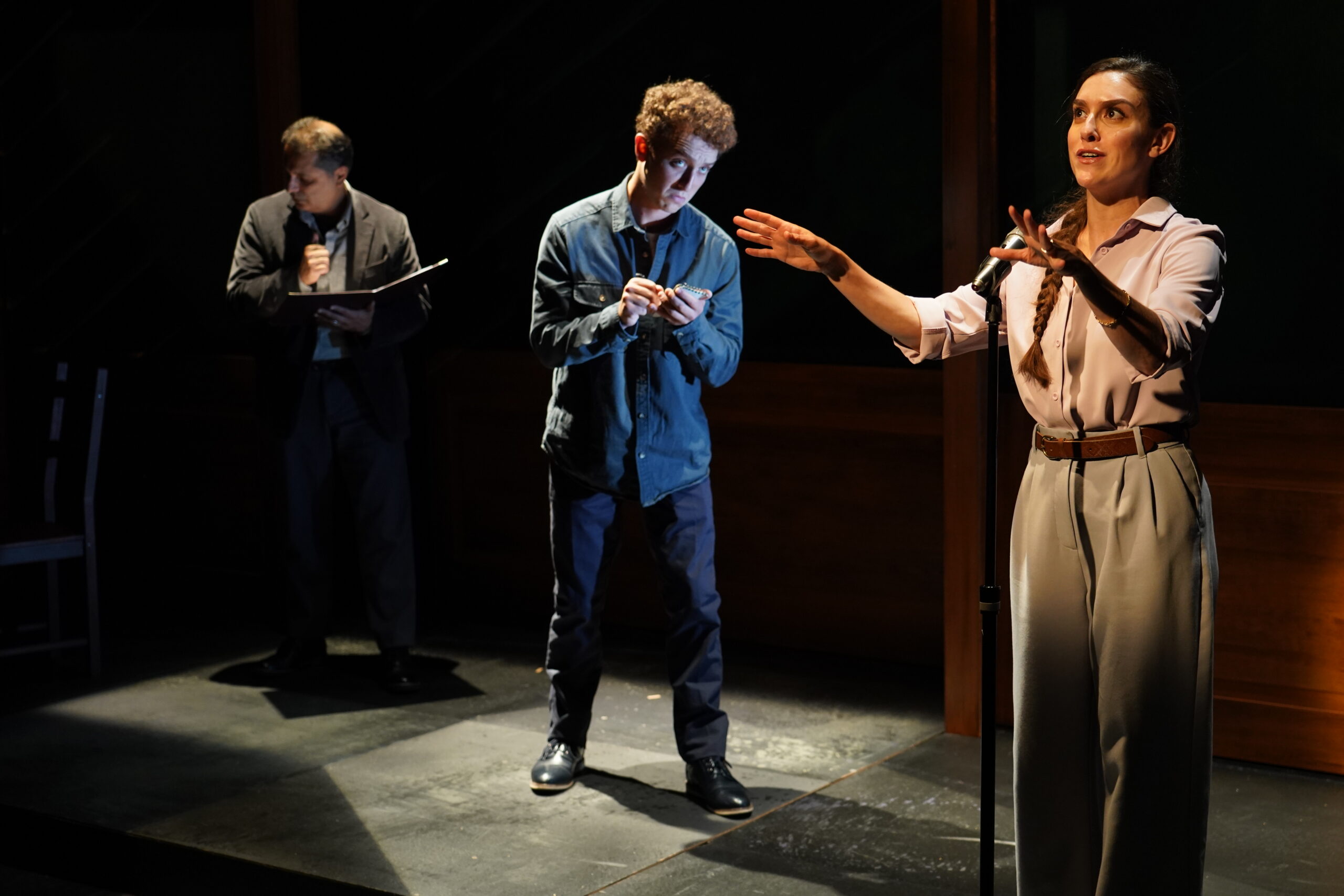
Firdous Bamji, Ethan J. Miller, and Dani Stoller in This Much I Know. Photo: Carol Rosegg
So you’re sitting in the theater, watching a play, and gradually you realize that the play is smarter than you are. What do you do? My advice: Don’t give up. Stick with it. The rewards can be great.
That’s what I discovered watching This Much I Know, the tantalizing, baffling, and ultimately highly entertaining new play by Jonathan Spector, author of Eureka Day, now playing at 59e59 Theaters. It took me till almost the very end of this two-and-a-half hour play to figure out what was going on. But what fun it was along the way.
The play begins with a “turn off your cellphones” announcement, made by a charming, disarming stage manager (at least that’s who we think he is). Only it turns out he’s a character in the play that’s already started. He’s a psychology professor named Lukesh (the magnetic Firdous Bamji), giving a lecture on how we think. We become his attentive students, fascinated by the slides he’s showing us of the brain and its functions.
Then suddenly Lukesh switches gears again and shows us a slide of a text message he just received from his wife, Natalya, announcing that she’s leaving him. “I’ll be gone for a while,” her message says. “It’s nothing you did.”
From that point, what began as an existential monologue turns into a three-character mystery about the disappearance of Natalya (Dani Stoller). We learn that while driving her car, she hit a cyclist who did not survive the crash. Traumatized at this event, she decides to leave and (here’s where it gets tricky) go on a trip she’s always wanted to take: to Russia, to learn more about her grandmother Natalya, and whether she had any relationship with Svetlana Alliluyeva Stalina. (What?! you’re thinking. I was too, at that moment). That’s how this play and the hyperactive imagination of this playwright work, as they follow the story into more and more surreal territory.
Meanwhile, there’s a second story running parallel, involving the third character in the play. Harold (an engaging Ethan J. Miller) is a student Lukesh’s, who has come to his office to ask the professor if he will sponsor Harold’s thesis on his own father, a leader in the white nationalist movement. This launches a series of conversations on political philosophy, almost as heady as the lecture on psychology.
So how do these story lines connect, you might wonder? That’s the brilliance of this play’s complex parallel structure, as it segues back and forth between one story and the other, punctuated by lectures from the professor. The connection is made by the cast, playing multiple roles. Ethan Miller (Harold) plays several characters in Natalya’s parallel story: a Russian she meets on a train, an old man in a Russian home for the aged, and each of Svetlana Stalina’s four husbands, whom she introduces to us. Firdous Bamji, the actor playing Lukesh, also becomes the voice of giant projections onstage of Stalin and Harold’s father, who converses with Natalya and Harold. So, like Harold, Lukesh is participating in both story lines. Meanwhile, Dani Stoller plays Natalya, Natalya’s grandmother, and Svetlana Stalina as a young woman and an older woman.
Are you with me so far? Honestly, I was about to give up halfway through, until I suddenly recalled Tom Stoppard’s Travesties, a brilliant 1974 surrealist comedy that also features a famous Russian (Lenin, actually), as well as James Joyce and Tristan Tzara (father of the Dadaist movement), famous but unrelated historical figures in Zurich at the same time in 1917. Although they never met, Stoppard connects them through a (nonexistent) production of Oscar Wilde’s The Importance of Being Earnest (don’t ask me to go any further—it’s even more convoluted than Spector’s play!).
Like Stoppard’s play, This Much I Know is a hybrid: a play of ideas, a mystery, an absurdist surreal comedy,, and ultimately a stimulating, moving evening of theater. Under Hayley Finn’s brisk, spirited direction, the superb, versatile actors make it worthwhile to decipher. Misha Kachman’s clever set, with its doors and floors that slide open and shut, functions like the puzzle of the play’s structure. And of course there are the hilarious, show-stopping projections of Stalin and Harold’s father by Mona Kasra.
Still the element that is most challenging—once you decipher the parallel plots (if you can)—is the professor’s recurring lecture about the brain, perception, and decision-making. Spector deftly resolves this by making his play, ultimately, a deeply human story about a marriage. In his final lecture, the professor concludes that life is determined not by fate, luck, or instinct, but by what we choose to do. Lukesh (who reminds me of Richard Burton with his powerful range of emotions) realizes he may have failed Natalya by reassuring her that the accident was not her fault. Instead, perhaps he should have chosen to accompany her on the journey to recovery instead: the one that she designed.
Ultimately, you emerge from the theatre buzzy from ideas, dizzy from the plot, fizzy from the entertainment. I am still not quite sure I grasped the complexity of the journey, but this much I know—I had a delightful time.
